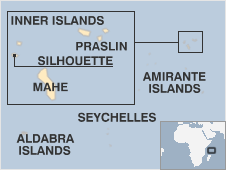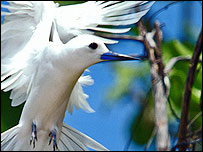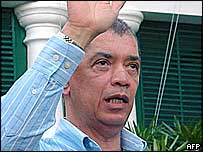
|
Citizens of the Indian Ocean archipelago enjoy a high per capita income, good health care and education.
Overview
But just a year after independence in 1976, the Seychelles appeared to be heading down the path of instability which has plagued many African states.
|
AT-A-GLANCE

Politics: The Seychelles People's Progressive Front (SPPF) has been the ruling party since 1977, when France Albert Rene came to power in a bloodless coup
Economy: Tourism and the fishing industry are the country's biggest foreign exchange earners
|
The prime minister, France Albert Rene, overthrew the president, James Mancham, and embarked on a programme aimed at giving poorer people a greater share of the country's wealth.
His coup, though bloodless, resulted in about 10,000 islanders fleeing the country. Four years later, with the help of Tanzanian troops, Mr Rene thwarted an attempt by South African mercenaries to restore Mr Mancham.
An army mutiny in 1982, followed by several attempted coups, suffered a similar fate.
But in 1991, possibly in response to pressure from foreign creditors and aid donors, Mr Rene restored multi-party democracy.
The country's economy depends heavily on a fishing industry and upmarket tourism; the latter is vulnerable to downturns in the global travel market. Fine beaches and turquoise seas are among the main attractions.
The archipelago is home to an array of wildlife, including giant tortoises and sea turtles. Much of the land is given over to nature reserves.
Facts
- Full name: The Republic of Seychelles
- Population: 84,600 (UN, 2006)
- Capital: Victoria
- Area: 455 sq km (176 sq miles)
- Major languages: English, French, Creole
- Major religion: Christianity
- Life expectancy: n/a
- Monetary unit: 1 Seychelles rupee = 100 cents
- Main exports: Fish, cinnamon bark, copra, petroleum products (re-exports)
- GNI per capita: US $10,290 (World Bank, 2008)
- Internet domain: .sc
- International dialling code: +248
Leaders
President: James Michel
James Michel succeeded France Albert Rene, who led the country for almost three decades before stepping down in April 2004.

President James Michel succeeded veteran leader Albert Rene
|
In July 2006 Mr Michel won a five-year term in presidential elections.
A former vice president, he had served alongside Mr Rene since 1977, when a bloodless coup brought the long-term leader to power.
Mr Michel pledged to hold a more open dialogue and to involve the private sector in the debt-ridden national economy. Some analysts have praised him for executing long-needed but painful reforms to liberalise the economy.
Mr Michel, a former teacher, entered politics in 1974. He had a 16-year military career and retired from the armed forces in 1993 with the rank of colonel.
The president is the head of state and appoints the Council of Ministers - an advisory body. Most members of the legislative body, the national assembly, are directly elected. Michel also holds the defence, police, information, and risk and disaster management portfolios.
In the 2006 elections he gained nearly 54% of the vote compared with the almost 46% won by Anglican priest Wavel Ramkalawan. In the 2001 polls Ramkalawan won 45% compared with Rene's 54%.
In the May 2007 elections, the Seychelles People's Progressive Front retained all 23 out of the 34 seats in the national assembly. The opposition Seychelles National Party (SNP) took the remaining 11 seats.
Media
The government controls much of the islands' media, and operates radio and TV stations and the sole daily newspaper.
Freedom of speech has improved since one-party rule was abolished in 1993, and private or pro-opposition publications have been robust in their reporting despite tough libel laws.
However, the opposition weekly Regar has regularly been sued for libel by the authorities. In October 2006 it stopped publication in protest against what it called constant threats from the government.
Steep licensing fees have discouraged the development of privately-owned broadcast media.
Multi-channel cable and satellite TV services are widely available. The BBC World Service and Radio France Internationale are available on FM.
The
press
- Seychelles Nation - government daily
- The People - ruling party weekly
- Le Nouveau Seychelles Weekly - opposition weekly
- Regar - opposition weekly
Television
- SBC TV - state-run, operated by Seychelles Broadcasting Corporation (SBC)
Radio
- SBC - operates national mediumwave (AM) service and music station Paradise FM
News
agency
-
Seychelles Agence Press
AFRICA
|
ASIA-PACIFIC
|
AMERICAS
|
EUROPE
|
MIDDLEEAST |
SOUTHASIA![]()
![]()
![]()
![]()
![]()
![]()
Mauritania
Mauritius
Morocco
Mozambique
Namibia
Niger
Nigeria
Republic-of-congo
Rwanda
Sao-tome-and-principe
Senegal
Seychelles
Sierra-leone
Somalia
South-africa
Sudan
Swaziland
Tanzania
The-gambia
Togo
Tunisia
Uganda
zambia
Zimbabwe
Australia
Brunei
Burma
Cambodia
China
East-timor
Fiji
Indonesia
Japan
Kazakhstan
Kiribati
Kyrgyzstan
Laos
Malaysia
Marshall-islands
Micronesia
Mongolia
Nauru
New-zealand
North-korea
Palau
Papua-new-guinea
Samoa
Singapore
Solomon-islands
South-korea
Taiwan
Tajikistan
Thailand
The-philippines
Tonga
Turkmenistan
Tuvalu
Uzbekistan
Vanuatu
Vietnam
Antigua-and-barbuda
Argentina
Bahamas
Barbados
Belize
Bolivia
Brazil
Canada
Chile
Colombia
Costa-rica
Cuba
Dominica
Dominican-republic
Ecuador
El-salvador
Grenada
Guatemala
GuyanaHaiti
Honduras
Jamaica
Mexico
Nicaragua
Panama
Paraguay
Peru
St-kitts-and-nevis
St-lucia
St-vincent-and-the-grenadines
Suriname
Trinidad-and-tobago
United-states-of-america
Uruguay
Venezuela
Albania
Andorra
Armenia
Austria
Azerbaijan
Belarus
Belgium
Bosnia-hercegovina
Bulgaria
Croatia
Cyprus
Czech-republic
Denmark
Estonia
Finland
France
Georgia
Germany
Greece
Hungary
Iceland
Ireland
Italy
Latvia
Liechtenstein
Lithuania
Luxembourg
Macedonia
Malta
Moldova
Monaco
Montenegro
Norway
Poland
Portugal
Russia
San-marino
Serbia
Slovakia
Slovenia
Spain
Sweden
Switzerland
The-netherlands
Turkey
Ukraine
United-kingdom
Vatican
Algeria
Egypt
Iran
Iraq
Israel-and-palestinian-territories
Jordan
Kuwait
Lebanon
Libya
Mauritania
Oman
Saudi-arabia
Sudan
Syria
Tunisia
United-arab-emirates
Yemen
Afghanistan
Bangladesh
Bhutan
India
Nepal
Pakistan
Sri-Lanka
The-Maldives

